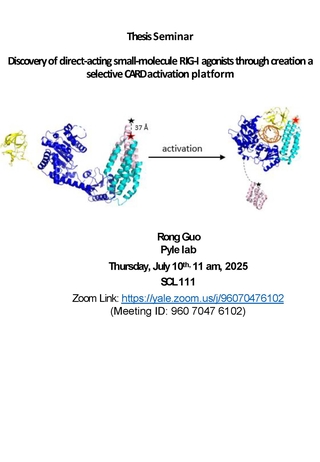Please join Yale Chemistry for a thesis seminar with Rong Guo, Pyle Lab.
Summary: Retinoic acid-inducible gene-I (RIG-I) plays a pivotal role in recognizing and combating RNA viruses in humans, and it has become a drug target of significant interest. RIG-I agonists composed of dsRNA represent antiviral and antitumor therapies, however the development of small-molecule RIG-I agonists, with their potential for improved pharmacokinetics, remains an unmet need. In this thesis, we report the first small-molecule RIG-I agonists that directly activate the RIG-I receptor protein. These agonists stimulate the first step in RIG-I signaling by triggering release of the signaling domains (CARDs) from an autorepressed form of the protein. This was achieved by developing a sensitive high-throughput screening (HTS) assay that directly monitors CARD expulsion through optical methods. The resulting screen hits were refined and optimized, leading to a specific RIG-I agonists that induce a robust interferon response. This study establishes a promising pharmacophore and assay for development of small molecules that precisely modulate RIG-I signaling.
Location: Sterling Chemistry Lab (SCL), Room 111
